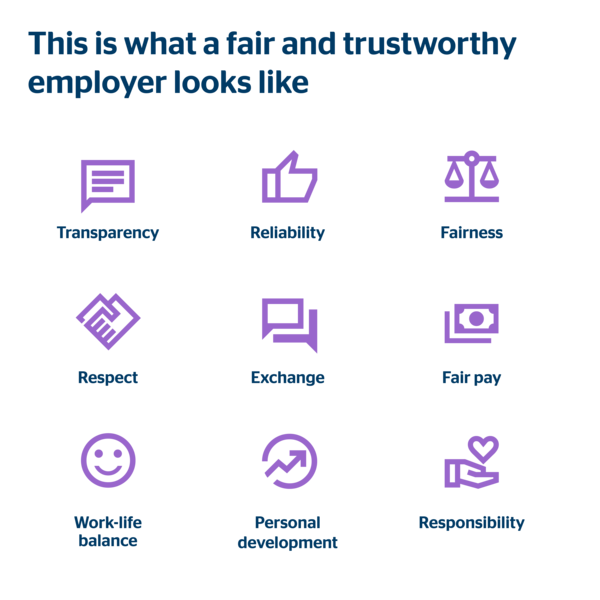Trust in the workplace: How to recognise a fair employer
|

reading time: ca. 5 minutes
- A culture of trust is an important indicator of the relationship an employer builds with their employees. It includes, for example, transparency, communication, and internal dynamics within the organisation.
- A genuine culture of trust ensures a pleasant working atmosphere and successful cooperation. This is why you should pay attention to certain characteristics that help you recognise a trustworthy employer. There are also warning signs that indicate a lack of trust.
- When researching a company, you get an initial impression of how transparently it communicates and what the corporate culture is like. You can obtain more detailed information through specific questions during a job interview.
- To create an atmosphere of trust within your team, you should pay particular attention to honesty, transparency, and open communication. Shared goals and successes, feedback, and constructive conflict solving also contribute to team spirit.
Trust within a company is the basis for strong cooperation and a positive working environment. If values such as transparency and fairness are not only promised but also practised, both employees and the company itself benefit. But how do you recognise an employer that is truly trustworthy and transparent?
Greater satisfaction, creativity, productivity, and team spirit – these are just some of the benefits that come with an environment based on trust. Especially in times of New Work, remote working, and digital communication, a culture of trust is becoming increasingly relevant.
Fortunately, there are certain characteristics that help you identify a fair employer. Good research and the right questions in job interviews will give you a clue as to which values are practised in everyday working life. And with a few tips, you can contribute to building trust in your team yourself.
What is a culture of trust?
In a culture of trust, everyday working life is characterised by mutual respect and transparent communication.
Trust in the workplace means that employees and managers rely on and value each other. They are given freedom and responsibility. Plus, they are openly informed and involved in decisions.
Trust also means:
- Treating each other with respect
- No fear of making mistakes
- Mutual support
- Open feedback culture
- Freedom for own ideas and personal development
How to find out whether a company is trustworthy
To recognise what the culture of trust looks like, you need to gather some information. This is how you can approach it:
- Research: You can find a lot of information on the internet, for example on the company website. Here you can learn about the corporate culture, values, and job benefits. The company may also share further insights on its own social media channels.
- Corporate communication: Observe how transparently the company communicates and provides information about goals, finances, or other internal data. The website, blog, social networks, and newsletters are important sources.
- Insider experiences: Using job networks such as LinkedIn, you can quickly find out whether you know someone who works at the company – or know someone who knows someone. Here you can ask about the feedback culture or working atmosphere.
- Enquire: Ask the company for a contact person who you can get information from. The job interview is also a very good opportunity to ask questions about the corporate culture, internal processes, and working atmosphere.
Watch out for the following aspects to assess the culture of trust and fairness:
- Transparent communication
- High reliability
- Fairness and integrity
- Respect and appreciation
- Open exchange
- Fair pay
- Good work-life balance
- Opportunities for personal development
- Social responsibility

Transparent communication
A transparent company communicates its goals, strategies, and decisions openly. However, transparency does not only mean disclosing data. It also means providing honest and clear information about the processes and reasons behind them.
High reliability
Promises are kept, both towards applicants and employees as well as towards business partners and the public. The company is honest and fulfils its pledges.
Fairness and integrity
All employees are treated equally. Working conditions are fair and transparent. The company adheres to ethical principles and takes responsibility. Internal guidelines, such as a Code of Conduct, are favourable.
Respect and appreciation
Interaction within the company is respectful and at eye level. This also applies to communication with applicants: They are not treated as supplicants, but as equal and valued people.
Open exchange
Regular meetings and a constructive feedback culture ensure that everyone can express their opinion and make suggestions. Employee feedback and ideas are appreciated and incorporated into company decisions.
Fair pay
Fair and appropriate salaries acknowledge the performance of employees. Transparent overtime regulations are also part of fair working conditions.

Good work-life balance
The employer cares about the well-being of its employees. A healthy work-life balance is supported, for example, by flexible working hours and working from home.
Opportunities for personal development
Employees are encouraged to excel. They are given the opportunity to develop their skills further – for example through new tasks and challenges, advanced training, or coaching.
Social responsibility
The company is not only committed to its own employees, but also to community interests, the environment, and social concerns. This shows that humanity is a major priority.
Measures to build trust
A strong culture of trust can be built through various methods, including:
- Regular feedback meetings
- Transparent decision-making processes
- Clear communication of goals and strategies
- Equal treatment and fairness, for example by developing internal behavioural guidelines
- Support and empathetic interaction with one another
- Promotion of work-life balance
- Strengthening team spirit, for example through events and team building
Conclusion: Trust is the basis for job satisfaction
A culture of trust in the workplace is key – both for the success of a company and employee satisfaction.
It is therefore worth investing time for research and thorough enquiry if you are looking for a good employer. In an environment where trust and fairness are practised, all employees are valued.











